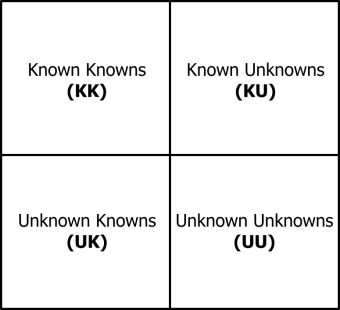You know…you don’t know what you don’t know, right? And that’s OK. For when that happens, let’s try the following advice.
During a press conference in 2002, the former Department of Defense Secretary of the US Donald Rumsfeld started a school of thought that, unbeknownst to him, provided another way to look at the understanding of Knowledge. That something was given the name of The Rumsfeld Matrix.
This matrix is created by the combination of what is known and what is unknown and is divided into four quadrants:

1st Quadrant – Known Knows (KK)
This quadrant defines plain and simple facts or the tangible knowledge you possess.
For example, you know that you know how to speak your native language, how to drive a car, or how to operate your laptop.In other words, you are aware of your personal competence in specific areas.
2nd Quadrant – Known Unknowns (KU)
In this quadrant, you find those things that you know that are out of your level of expertise.
You may know that you speak English, but you know that you don’t know how to speak Cantonese. Or even though you speak English, you know that you don’t know how to rap in English.
You know that you can ride a bike, but you know you’d drown if you needed to sail a boat.
3rd Quadrant – Unknown Knowns (UK)
The 3rd quadrant is the Unknown Knows.
This one is tricky because it relates to things that we sense but are not fully aware of.
It also includes our blind spots, those areas where our peripheral vision cannot reach. This also includes our mental blind spots.
Some people also consider our intuitions and cognitive biases as part of this category. Those hunches that tell us what to do without explaining the why.
4th Quadrant – Unknown Unknowns (UU)
The 4th quadrant is the remaining one: Unknown Unknowns.
Here we place situations that are so unexpected, they would not be considered at all. They were completely out of the realm of the possibilities, but they still happened!
Imagine the unimaginable, and probably even then, you’ll stand far off from what we’ll discover in the future.
Maybe in a galaxy, far far away, there actually exists a Yoda, a Luke Skywalker, and a Kylo Ren, and they don’t look at all like the ones in the movies. Who knows!? But you get the point.
Putting Things in Perspective
Now, the proportions of these quadrants are something like this:

The more that we discover new things (i.e., the more that we discover UUs), the more that the bucket of KU and UK grow, and the smaller the KK bucket gets.

If you consider yourself a Life-Long Learner, this realization can leave you feeling defeated, especially when realizing that we’ll never accumulate that much knowledge.
Furthermore, we need to consider this: a lack of information is innocence but having false information is ignorance.
I don’t point this out to make us feel sad but to make peace with the fact that the UUs are forever infinite, and that probably what we know right now is not and will never be the ultimate truth.
So, instead of defaulting to hopelessness based on this realization, we need to find another way.
What to Do?

Do you remember when humankind believed the Earth was the center of the Universe? or when we thought the Earth was flat? Having those beliefs made us egotistical and afraid of sailing beyond the horizon line.
Therefore, the goal is not to become “immensely knowledgeable” but instead to make sure that the current knowledge we have is aligned with reality as closely as possible.
Obviously, acquiring more knowledge doesn’t cause any harm. Instead, gaining more knowledge works as a kind of sieve to filter what truly is important and discard false information.
Socrates, according to his student Plato, once said, “I know that I know nothing,” and he was ok with that.
That did not mean he gave up learning new things. It meant that he was humble enough to admit he only knew the bare minimum, and despite it, he was going to keep learning with a beginner’s mind.
Therefore, the alternative to hopelessness and despair is to continuously learn new things (increasing your KK), and also validate over and over again our tiny knowledge (refining your KK).
Like a castaway navigating his way to safe land in the midst of a storm, we need to aim to continuously acquire new data and refine what we already know.
The author Cheryl Strayed once said:“I was amazed that what I needed to survive could be carried on my back. And, most surprising of all, that I could carry it.”
In our case, we’ll be amazed at how little we need to know to help us not only survive but thrive in this brave new world.
What’s something that you learned this week? How much and how well do you know what you know? Let’s keep the conversation going in the comments below!


2 Responses